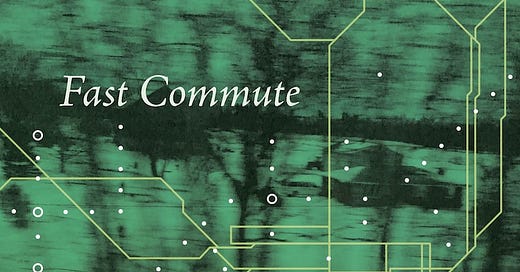Excerpt from Fast Commute
Waiting for the ads on the airplane map to end
so you can see where over Gitchigami you are hurtling,
how you’ll proceed over Thunder Bay,
breakwaters of ice foreshadowing where rock rises
above the level of water
Gypsum beds along the Grand River, the oil in the Thames,
flecks of gold in the North Saskatchewan
As long as the pysanky are written,
life will continue
Seeds in cold soil, early greens, early peas.
That smell is either brassica or pesticide
The white, weaponized self
making headlines every few days,
unfathomable to those who
haven’t been subject to it,
the damage an explosion
through time, a fire gobbling oxygen
Carnage of the highway: raccoon, fox, cat, coyote, skunk, snake,
turtle, deer, gull, butterfly, crow, bee, dog, squirrel, uncountable
other insects
I have to turn away from the house and toward the fire,
slough the neon that tries to distinguish me from fuel,
gaze into that blue centre, try not to look away or will an explanation
Natal Day, 1915, children grouped according to age
in front of the hotel, which houses the bank, each class
hoisting a banner, pale men in dark suits all around
Sugar beets, an emptiness,
shoeless in the field
The bright beige dress of a sapling in a woodlot,
bent branches like a closed umbrella
The silver of moon, the rooming house, the cop car,
its cherries going, the wind, the man in the upstairs window
asserting obliviousness before a computer, who wrote
NATIVE in red chalk on the road during the street festival
and should be admired but is instead ignored, which is
better overall than receiving attention
The war monument and the climate-change photography
side by side in the public square,
hashtags organizing
Toxins dumped in rivers,
carried off and monetized
And the quasi-religious ideas behind Arbor Day, landscapes scraped
to treeless, the inflexible grid duplicates, the buildings same, craters of grids
deployed and deployed, the trees equidistant, transplants put down
in a spasm of public care, a donated truckload of mulch ready to suffocate them
Everyone was silent,
she says. Nobody spoke of
Holodomor and were encouraged
to lie about it and were threatened
when they wouldn’t
My dad, with his brother, surveying in muck to the top
of the hip waders, somewhere in Saskatchewan,
I gotta do something else with my life
A five-year-old on a school bus wearing cat ears, crying,
staring hard at me as I wait at my stop
The sparrows at my feet,
the water bottles, the legacy—
a geyser erupts for the first time in decades,
spews a chronology of trash
catalogued by the archaeologists
The broad willow trunk. The weeping birch of childhood.
Towers piling up like a nightmare. Dense thickets
of monoculture. The railway, the roads, the walking trails
subverting natural north-south travel.
The bollards block the creek from view while we’re driving.
Heavy machinery pressing new divots into the inside joke
of new roads. The creek split and unspooling
as the cars burn a bit more pitch to go get toilet paper,
the creek distended as heavy roots push up asphalt
walking trails, the effort spray-painted orange for safety,
the path leading over a bridge to an abandoned lot’s
checkers of weeds and concrete. Delivered by civic neglect
into trespass, culvert-minded, with polypropylene streamers
to approximate leaves in wind. A developer slaps his vinyl sign
on the side of a barn, his imagined new edge of a city.Laurie D. Graham is a writer, an editor, and the publisher of Brick magazine in Toronto. She grew up in Treaty 6 territory, outside of Edmonton, and she currently lives in Nogojiwanong, aka Peterborough, Ontario, in the territory of the Mississauga Anishinaabeg. Laurie is descended from homesteaders who came from Ukraine, Poland, Northern Ireland, and Scotland about a century ago to farm in Alberta and Saskatchewan. Here newest book of poetry, Fast Commute, is out now from McClelland & Stewart; her other books are Rove and Settler Education.
Fast Commute by Laurie D. Graham McClelland & Stewart, 2022
A powerful book-length poem on environmental destruction and the violences of colonial nation-states from the acclaimed author of Settler Education.
Here is a lament for places in flux, where industrial, commercial, or suburban development encroaches or invades. From Highway 401 to Refinery Row east of Edmonton, from Lake Ontario to the Fraser River, this long poem takes aim at the structures that support ecological injustice and attempts new forms of expression grounded in respect for flora, fauna, water, land, and air. It also wrestles with the impossibility of speaking ethically about “the environment” as a settler living within and benefiting from the will to destroy that so often doubles as nationalism.
Following physical routes and terrains, Fast Commute exists both within and outside the dissociative registers of colonialism and capitalism. This deeply engaging book offers a way to see, learn about, and live in relationship with other-than-human life, and to begin dealing with loss on a grand scale.
Support Send My Love to Anyone
Support Send My Love to Anyone by signing up for a monthly or yearly subscription, liking this post, or sharing it!
Big heartfelt thanks to all of the subscribers and contributors who make this project possible!
Connect
Bluesky | Instagram | Archive | Contributors | Subscribe | About SMLTA






